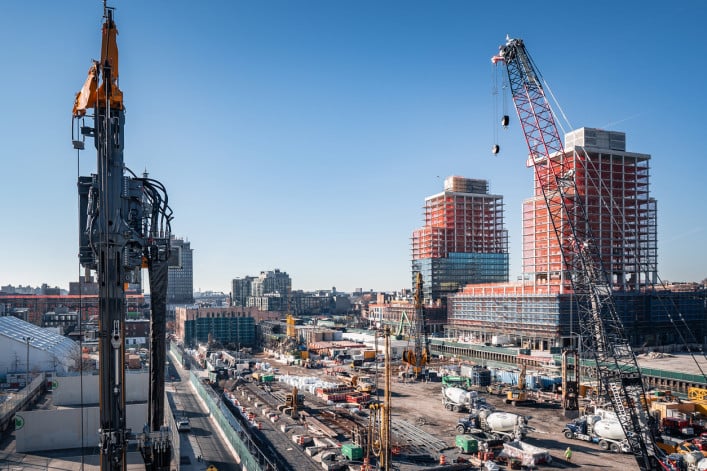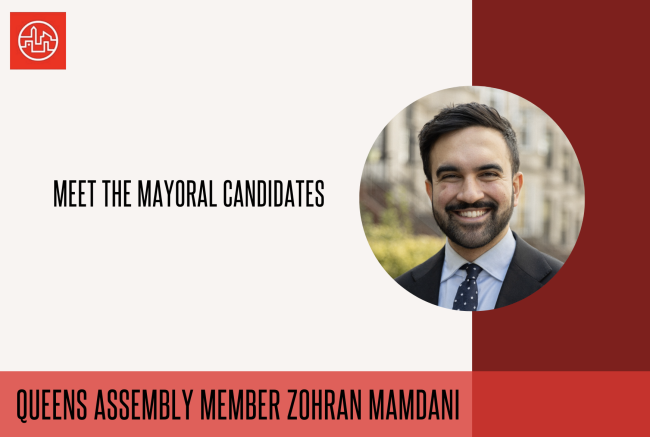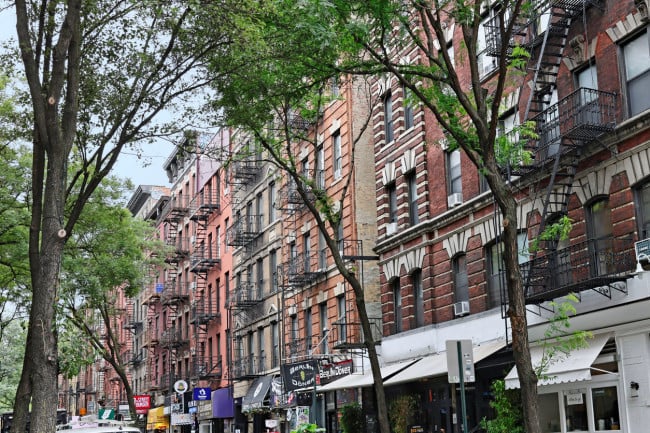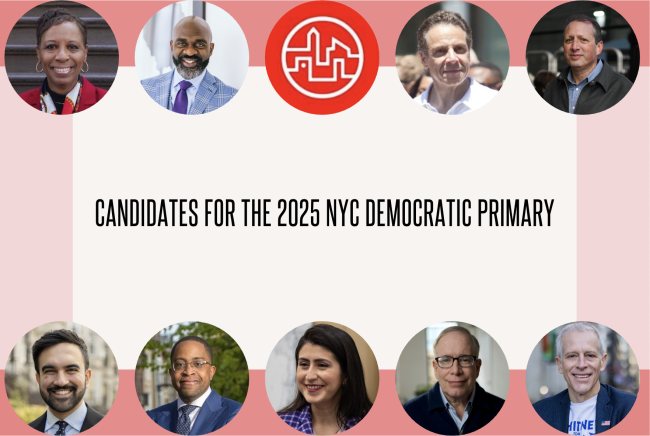Your vote: What you need to know about the affordable housing questions on the November ballot
- You're not just electing a new mayor: New Yorkers will vote on how affordable housing is built in NYC
- Three proposals aim to speed up certain affordable developments and curb ‘hyperlocal perspectives’
- The City Council tried to block putting the measures on the ballot, dubbing them a ‘City Hall power grab’

Apartment buildings under construction in Gowanus, Brooklyn. The November ballot measures would give the City Planning Commission and other agencies, rather than the City Council, the power to approve affordable housing projects.
iStock
On this election day, New Yorkers have the chance to vote on three ballot measures that could rewrite how New York City's government signs off on certain affordable housing developments.
The three ballot questions kicked off a fight: Pro-development advocates said they planned to spend millions to encourage locals to vote yes while the City Council sent mailers firmly opposing them.
[Editor's note: A previous version of this article ran in September 2025. We are presenting it again in case you missed it.]
The measures would give the City Planning Commission and other agencies, rather than the City Council, the power to approve affordable housing projects, particularly in neighborhoods that produce few affordable apartments. Advocates say the changes would pave the way for affordable housing construction in NYC—something NYC desperately needs to keep up with demand—and early polling shows that the measures are popular, Politico reported.
“We have failed to build the housing New Yorkers need, leaving tenants to fight over too few affordable homes,” said Annemarie Gray, the executive director of pro-development group Open New York, in a statement. “These ballot measures finally give New Yorkers a chance to vote for systemic changes to bring down housing costs."
But the City Council said the proposals from the Charter Revision Commission—convened by embattled Mayor Eric Adams—are a power grab intended to weaken the Council’s authority over development, and as a result, the power of local constituents. (City Council Speaker and former-mayoral candidate Adrienne Adams pushed to keep the questions off the November ballot earlier this month.)
“We believe in delivering real housing solutions that meet the needs of our communities, not misleading schemes to trick voters, take away their voices and power, and provide giveaways to developers,” Julia Argos, a spokesperson for the City Council, said in a statement.
It’s true that these ballot proposals would limit the role of the City Council. They also would, at least as written, speed up the process of approving certain affordable housing developments across NYC, provided that a future mayoral administration actually enacts these changes.
“It’s one thing to propose concepts for streamlining government approvals and processes, but it’s really all about the administration of that process,” said Spencer Levine, president of the developer RAL Companies.
Read on to understand exactly what you’ll be voting on. And just FYI: the housing-related questions are not the only proposals that will show up on your ballot in November. Read up on all of them here.
Proposal #1: A ‘fast track’ for affordable housing
The first ballot question proposes creating a “fast track” to speed up two things: zoning changes to allow for publicly funded affordable projects, and affordable developments in neighborhoods that see few new, rent-restricted apartments.
“The idea is to provide an opportunity for those projects that are special—in that they are either publicly-funded affordable housing initiatives, which tend to be 100 percent affordable, or projects in communities that don’t have affordable housing—and it will provide an opportunity for those to move forward in a different process,” said Herrick Feinstein attorney Mitch Korbey, who chairs the law firm’s land use and zoning group.
First, the proposal would allow a lesser-known city agency, the Board of Standards and Appeals (BSA), to rezone areas for affordable projects funded with city, state, or federal dollars, so long as those developments fit with a neighborhood’s character, according to the Charter Revision Commission’s final report. (The BSA—a group of five mayoral appointees including an architect, engineer, and city planner—is already charged with resolving disputes over zoning and land use issues, said Korbey, a former BSA member under former Mayor Rudy Giuliani.)
Normally, these rezonings would go through the city’s Uniform Land Use Review Process (ULURP), which budgets for roughly seven months of public hearings and reviews by a variety of city agencies, though it can take much, much longer. The proposed “fast track” slashes that time frame to just three months.
Second, the commission’s changes would also pave the way for faster development in neighborhoods that see the lowest numbers of new, affordable apartments. Those neighborhoods wouldn’t be determined until 2027, but as of last year, two council districts built no affordable housing projects: the Upper West Side and Eastern Queens, City Limits reported.
Under the changes, affordable developments in the 12 City Council districts that permitted the least amount of affordable housing could go through a fast-tracked approval process, where the local borough president and community board would have to evaluate the project at the same time. (Plus, the City Planning Commission would have 30 days, instead of 60 days under ULURP, to review a development application.)
All told, a faster process would make it easier to build housing in NYC, Levine said. That’s because the longer a developer has to wait to build, the more expensive a project becomes, and affordable developments already have more limited budgets, he added.
“Having been through the ULURP process several times, I think any improvements that streamline the process to bring a public benefit would certainly be welcome in the industry,” Levine said.
Proposal #2: Speedier reviews of ‘modest’ developments
If there’s anything NYC loves, it’s an acronym. The next ballot question proposes creating the Expedited Land Use Review Procedure (ELURP), which would “cut in half” the amount of time it takes to review certain projects looking to construct bigger buildings.
That shorter process would cut out the City Council and mayor’s role. Instead, the City Planning Commission’s decision would be final, according to the Commission’s report.
The report focuses on two types of rezonings that could go through ELURP: rezonings in medium and high-density areas (think Manhattan and Downtown Brooklyn) that would allow for up to 30 percent more residential space, and rezonings in low-rise communities (think Staten Island or the far-flung parts of the outer boroughs) to allow housing developments up to 45 feet tall. And any ELURP project must include permanently affordable housing to score more space or height, according to the commission’s report.
But the city could also use ELURP for a handful of other projects and rezonings, including raising street grades to protect areas from flooding, adding solar panels on city-owned property, and building housing on city land.
Proposal #3: A new appeals board with a say on affordable projects
Lastly, the commission proposed creating an appeals board that can override the City Council, if the council votes against a new affordable housing development or modifies it. That appeals board would be made up of the mayor, the president of the borough where the project lies, and the speaker of the City Council.
The move would shift power away from the City Council, where members have an unofficial veto power over projects in their districts. Council members can use that power to negotiate for better amenities or more affordable apartments, and can also block unpopular projects. The commission billed the board as a “limited check on the hyperlocal perspectives” that often “dominate housing development decisions,” according to the commission’s report.
This hypothetical board could give developers more certainty that their projects would be approved, though an appeal would likely not be a developer’s first choice, Korbey said.
“It might provide some level of assurance that this is not the final say, for certain important projects,” Korbey said. “But it would be unfortunate if it would have to come to an appeal, particularly for a project that has affordable housing.”
To Open New York’s Gray, the appeals board, the fast track, and the plan for modest developments would all help reform NYC’s current development process, “which amplifies the most anti-housing voices, perpetuating exclusion and driving up the cost of living.”
“These are questions about who this city works for,” Gray said in a statement. “Are we going to let NYC’s richest continue to block affordable housing, or are we going to build a city that’s affordable for everyone?"
You Might Also Like



























